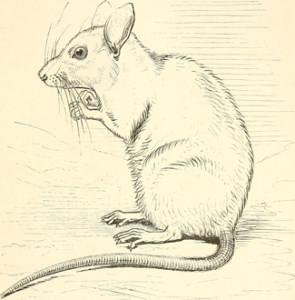Does Flooding Affect Rodent Behavior?
By Chris Williams on April 8, 2015.
 This last month Southern New Hampshire and Massachusetts have had lots of melting snow, and the water table has risen accordingly! It is not surprising to find increased rodent activity in times of flooding, especially if the water table rises for an extended period.
This last month Southern New Hampshire and Massachusetts have had lots of melting snow, and the water table has risen accordingly! It is not surprising to find increased rodent activity in times of flooding, especially if the water table rises for an extended period.
Like all rodents, mice and rats cannot breathe under water. Rats and mice can survive under water for short durations if forced to during times of duress. Rats have been known to swim great distances when dislocated by storms or flooding. Rats will also go to great lengths to survive, including making their way through drains and other plumbing apertures. Over the years I have encountered several rats that had found their way up toilets (a sewer project was under way nearby in all cases)!
Rats are cunning survivors and naturally seek out entry points to structures in search of safe harborage. Rats can nest in a variety of locations including but not limited: to burrows in the soil, wood and refuse piles, under and around building foundations, walls, insulation, attics, crawl spaces, chicken coops, dumpsters, dumps, domestic animals and live stock buildings, junk piles, abandoned structures of any kind, sewers or underground sub areas, etc. Rats need only three things to survive: Food (will eat almost anything), Water (usually is readily available and can be taken in through feeding), and harborage sites (see above). These three critical things can be used to manage rodent (rat) populations, or at least protect a specific structure or area from infestation. The critical area of concern at a residential structure is exclusion from entry. Next we need to consider where the rats could be feeding, and perhaps coming from. Since water is so abundant, we cannot control where they find it.
Portsmouth New Hampshire Rat Escapes Flooding Only to Perish In Trap!
Just this week in Portsmouth, New Hampshire a rat made its way into a client’s home (it turns out that our first meeting was to evict a wayward rat)! The first sign of trouble was an intermittent scratching soundin the living room wall. After two days of this sound I was called in to investigate the problem. Since our initial meeting involved rodent activity several years prior, I was familiar with the account. Along with routine inspections and baiting, I have been working with the homeowner to rodent proof the 200-year-old structure.
Less than a month prior, I had actually been at this site with no sign of exterior or interior activity on the bait material (placed strategically in child and pet resistant containers as specified by law). There were no droppings or visible rub marks noted during my most recent visit, but I did notice some of the gravel along the edge of the basement wall was disturbed, and a recently excavated rat tunnel was evident. Nearby, a two inch hole had been chewed threw some foam material covering a sump pump drain outlet (leading to the local sewer lines)! It was evident that a new rat had arrived! New bait placements were made within the structure, and traps were set. Two days later, on a follow up inspection, some of the bait material was gone, and a large Norway Rat was found on one of the traps. At over 8 inches long, it was definitely an adult rat.
Now that the offending rat has been removed, all plumbing access areas have been sealed with stainless steel screening. Anywhere that there was open gravel or soil has been covered with at least two inches of hydraulic cement to prevent future entry points. Although we have solved this episode, we will continue to monitor and evaluate the situation. Rats can be very destructive and cannot be tolerated. At the first sign of rats, the best course of action is to call Colonial Pest Control Inc. at 1-800-525-8084. We have the skills and materials to get the job done fast and effectively. We also consider the safety of your family and pets during all pest control activities. Don’t let rats take over your home!
Photo credit: Internet Archive Book Images / Foter / No known copyright restrictions
Stay up-to-date with Colonial Pest’s email newsletter!